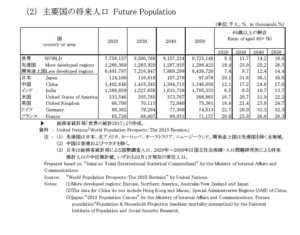Every day in the traditional medias and social medias, I encounter the news
discussing rapidly greying Japan and the shortage of labour with rather gloomy tone.
According to the official survey announced by the government in August 2017,
the total population (excluding foreign nationals) of Japan was 125 million,
decreased for eight consecutive years.
It decreased by 300,000 from the previous year, and was the highest drop since the survey
started in 1968. The number of registered foreign residents was 2.32 million.
In the meantime, the government also announced that Japan’s economy
expanded for the seventh straight quarter in July to September (2017),
the longest growth since 1994. So what is going on in Japan ?
Ironically the vigorous economy also highlights a chronic labour crunch
caused by the country’s ageing, shrinking population.
Japan now relies heavily on foreign labour, and experts have been
urging more public debate on immigration policy as Japan
continues to age and shrink.
On surface officially Japan is shrinking rapidly in deed but if you
consider the foreign workers who reside in Japan, you may want to think
twice before you make your investing decision in Japan.
Those people need homes and rooms to live.
The ministry of labour recently announced the latest status of
the foreign workers as of October 2017.
The total number of foreign workers was 1,278,670, an
increase of 194,901 (up 18 %) compared to the same period last year.
Since the data-taking began in 2007, it is the record high.
The number of entities hiring foreign workers was 172,798,
an increase of 21,797 (up 12.6%) compared to
the same period of the previous year.
It is also the highest since data-taking began in 2007.
By nationality, the government figures were shown as follows.
· China 372,263 (29.1 % of the total) up 8 %
· Vietnam 240,259 (18.8 % of the total ) up 40%
· Philippine 146,798 (11.5 % of the total) up 15.1%
· Brazil 117,299 (9.2% of the total) up 10%
· Nepal 69,111 (5.4% of the total) up 31%
Please note they are not Americans nor Europeans and came from relatively
unprivileged countries who are willing to take a job as the unskilled worker.
By status, there were 257,788 interns in job-training programs and
259,604 foreign students, with both categories increasing by more than 20%.
Nearly 80% of the interns worked in manufacturing or construction,
while over half of the foreign students were employed in retail or service jobs.
The largest group of 385,000 foreigners worked in the manufacturing sector.
They were followed by 189,000 workers in cleaning and other service sector
and 166,000 in wholesale and retail businesses, including convenience
stores and supermarkets.
The report also shows that foreigners made up about 2%
of all employees in Japan. The number of such workers began
rising sharply in 2012, jumping by roughly 600,000 over the last five years.
The ministry of labour also commented :
“a shortage of workers combined with Japan’s economic recovery have
pushed businesses to hire student part-timers and technical interns.”
In fact, this is the magic of Japan’s population.
Due to the tight labour market, many of above technical interns and students
are being hired to perform unskilled labor for low wages to fill gap of the shortages.
While the government has opened its doors to professionals specializing
in information technology and other specific fields, it does not officially
welcome unskilled labourers to avoid public debates on immigration,
which has long been a sensitive issue.
Why are those foreigners allowed to come to Japan
even they are seeking for the job of unskilled job ?
The answer is the “interns” are effectively treated
as short-term migrant workers and the government is
turning a blind eye to it.
In the manual labour which many Japanese don’t enjoy,
the shortage of hands is getting worse.
However, the government does not allow foreigners to enter
the country for the purpose of unskilled labour.
That is why ‘interns in job-training programs’ became as a way out there.
Under the name of “skill training” and “human resource development”
Japan actually is accepting unskilled workers.
All in all, while Japan’s official population is shrinking by 300,000 a year,
the total number of foreign nationals
is increasing annually by approx. 400,000-500,000.
Obviously some of foreign nationals are staying here only for the short period of time
but if you venture to include those who came to Japan under the name of
interns in job-training programs and students who are actually
working as part-timers in the fast restaurants and convenience stores,
Japan’s population is not shrinking rather balanced or even expanding.
Sounds dodgy ? I know but this is the reality.
Finally, I hereby quote the article regarding the immigration in Japan
in ‘Toyo Keizai’, Japanese weekly economic magazine.(They only publish the
magazines in Japanese so the translation is my responsibility)
“Interns in job-training programs are not supporting developing countries but
they have become a means to secure inexpensive labour.Also, although on
the mere face of it, they have student’s status, there are many “forged foreign students”
who actually stay for work purposes. The situation is unhealthy.
The accountability for creating a large amount of forged foreign students
also should be held by Japan that has relaxed the requirement to issue student visas
under the 300,000 international student program.
Japan inc. wants to accept those inexpensive people as the labour force, but
not as the official immigrants.
Japan has continued to use the double standard.”
Official report published by the Ministry of Health, Labour and welfare in January 2018
is attached as below link.

Future population of world major countries
presented by Mitsui Fudosan.
Toshihiko Yamamoto
Real estate investing consultant and author.
Toshihiko is currently writing a book about the real estate investing in Japan
for foreign investors.
Founder of Yamamoto Property Advisory in Tokyo.
International property Investment consultant and licensed
real estate broker (Japan).
He serves the foreign companies and individuals to buy and sell
the real estates in Japan as well as own homes.
He holds a Bachelor’s degree in Economics from
Osaka Prefecture University in Japan
and a MBA from Bond University in Australia


